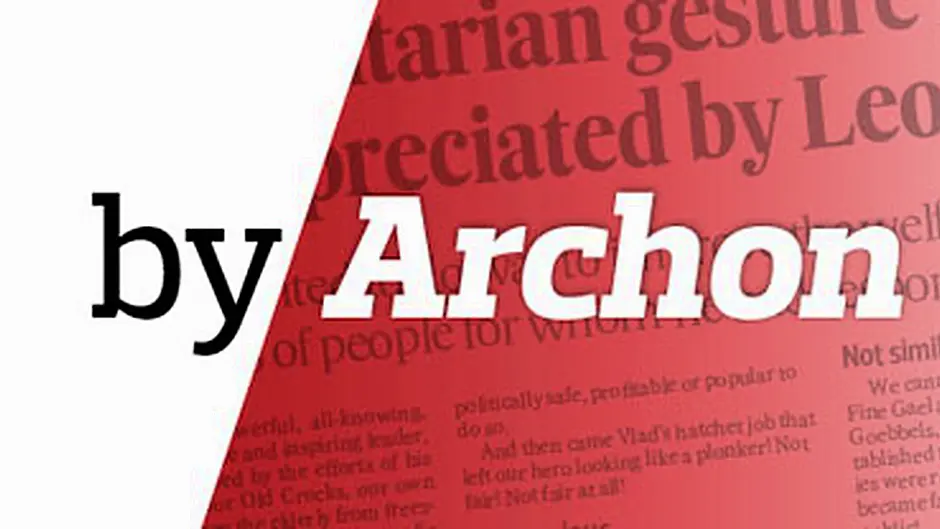Remember the Labour Party, that proletarian outfit which had as much success in improving the lives of Irish workers as the Man in the Moon?
REMEMBER the Labour Party, that proletarian outfit which had as much success in improving the lives of Irish workers as the Man in the Moon? Well, because not much is heard of Labour nowadays, we have an announcement to make on its behalf.
The party is not dead, bereft of life, defunct, departed, six feet under, or pushing up the daisies. Like Monty Python’s famous parrot, it has been ‘resting’ since the general election when it stunningly lost 30 seats.
Since then, Labour’s voiceless Dáil minstrels (seven in all) have tried desperately to keep the party’s pecker up with cunning plans, the latest of which is top class: they want Town Councils restored!
In an extraordinary public confession last week, leader Brendan Howlin admitted that Labour dropped a monumental clanger by supporting the notorious plan of then Environment Minister, Big Philly Hogan, to eradicate 80 town councils.
‘I took my eye off the ball,’ moaned a distressed Howlin. ‘I think it was the wrong thing to do,’ as he surveyed the parlous state of his shattered party and the fact that the cull of local councils did not benefit Labour in any way.
Sadly, his frank admission, acknowledgement of guilt and request for absolution for having made a total bags of things did not impress the plain people of Ireland who were unable to comprehend Labour’s abrupt reversal of attitude. Indeed stony-hearted patrons in the Cork Arms responded to Howlin’s almost tearful self-condemnation with the comment: ‘For Gawd’s sake, would someone please pass him an onion!’
A cunning plan
Nonetheless, we have to admire Howlin’s political shamelessness for having come up with the ingenious suggestion that the time was now right to restore many of the recently abolished 80 councils. It’s a plan so cunning that (to quote Blackadder) you could brush your teeth with it.
His plan is this: he wants a proposed piece of Labour legislation called the Local Government (Restoration of Town Councils) Bill to be made law. According to this Bill, there is a need to establish town councils again because ‘national and regional bodies have somehow lost focus on urban development’ and that ‘the lack of a local figurehead, such as a mayor, is adding to missed opportunities.’
What’s more, local town councils can be more responsive to people’s concerns ‘and quicker to react to issues’ because they provide ‘clear accountability in relation to money being invested to address local needs.’
In other words, Howlin intends to throw out the window all of Labour’s previous arguments in favour of abolishing town councils, and he expects local powers and local government to be restored before next year.
Significantly, in the eyes of Labour, the assertion that councils such as Clonakilty and Skibbereen were ‘an additional financial overhead for local government, duplicating administrative work in the areas of planning, housing and roads,’ no longer makes sense.
He argues that under a Labour government towns with a population of 1,000 or more would have a nine-member council while any town larger than 25,000 would have 15 local representatives. The cost of implementing the plan? A trifling €40 million!
Load of cobblers
Of course it’s possible that Labour is uttering nothing more than the spiel used by a salesman to flog crocked cars: a bit of pie in the sky and a stratagem to conceal humbug and quackery. Not to be taken too seriously!
Whether or not the electorate is idiotic enough to swallow such a load of cobblers remains to be seen but, in the meantime, people should not forget that Labour jumped too eagerly (and too indecently) on the FG bandwagon when it seemed public opinion was in favour of the abolition of councils. Now, in light of changing attitudes, Labour has jumped off the bandwagon like a scalded cat.
Compelling editorial
What a pity Howlin and crew did not pay heed to a compelling editorial in this newspaper in 2012 which said: ‘People can be as cynical as it gratifies them in bidding good riddance to town councils, but the drastic culling of local authorities will create a further democratic deficit that will never be compensated for, and the running of local affairs will fall more and more into the hands of further-removed unelected officials.’
Which is what happened; and, to rub salt in the wound, Labour did not enjoy any subsequent electoral bounce for its abolitionist efforts. In fact, they now realise that they participated in a debacle and got in return a political glugger that did immense damage to the party and to Howlin.
New boundaries
Complicating matters further is the fact that Fine Gael will not support Labour’s ‘Restoration of Town Councils Bill’. Vlad and the buckos have no intention of going down that road, having opted instead for a policy of reducing the size of electoral boundaries in time for the 2019 local elections.
Unlike Labour’s gormless strategy, Fine Gael plans to reduce the size of several local electoral areas. For example, they argue that in some cases Dublin councillors have to represent as many as 50,000 people, which makes a mockery of the concept of ‘local’ government.
Housing Minister Eoghan Murphy’s solution to the problem is the implementation of electoral boundaries ‘that reflect the communities people actually live in.’ He appealed for party political interests to be put aside when his ‘independent commission’ begins making the changes. Cue Labour!
Vlad endorses the boundary overhaul on the basis that local councillors are unable to represent areas that are the size of a city. Interestingly, last November he denied that Fine Gael was trying to ‘gerrymander’ such places. He commented: ‘The reason why we had a big increase in the number of nine and 10-seaters five years ago was very much at the behest of the Labour Party who believed in doing so at the time would help more Labour councillors to hold their seats. That actually didn’t happen,’ he said.
Downsizing works?
In the meantime, against the background of Labour’s contrition and confusion, and Fine Gael sticking to its ‘Boundary Change Policy’, it is not without significance that everything is going tickety-boo for Clare County Council, which wiped out three town councils and reduced the number of councillors by 40 since the local elections.
The abolition of councils and the downsizing of councillors from 68 to 28 has saved Clare County Council a whopping €408,000. And that’s a lesson in itself.
From a financial perspective, reducing the size and scope of an electoral area can work. Indeed, one wonders what savings Cork County Council has made – if any?








